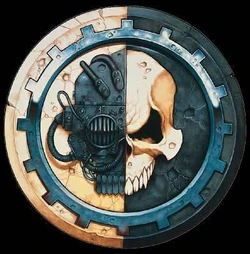No edit summary |
No edit summary |
||
| Line 1: | Line 1: | ||
| − | {{Quote|They Shall Not suffer a Machine to Think! For Ruin Shall be its Purpose and Accursed be the Work.| Archmagos Takashi Ludd, "''Castigations upon the Logistica Corpus''"}} |
+ | {{Quote|They Shall Not suffer a Machine to Think! For Ruin Shall be its Purpose and Accursed be the Work.| Archmagos Takashi Ludd, "''Castigations upon the Logistica Corpus''"}} |
| + | [[File:Adeptus_mecanics.jpg|thumb|250px|Icon of the [[Adeptus Mechanicus]]]] |
||
The '''Crimson Accord of Mars''', also known simply as the '''Crimson Accords''', are one of the cornerstones of doctrinal law of the [[Adeptus Mechanicus]]. They were first promulgated during the foundation of the ancient [[Mechanicum]] on [[Mars]] in the midst of the [[Age of Strife]], and forever forbade the creation of the abominable and soulless artificial general intelligence known as the [[Silica Animus]] and required the destruction of any still existing. |
The '''Crimson Accord of Mars''', also known simply as the '''Crimson Accords''', are one of the cornerstones of doctrinal law of the [[Adeptus Mechanicus]]. They were first promulgated during the foundation of the ancient [[Mechanicum]] on [[Mars]] in the midst of the [[Age of Strife]], and forever forbade the creation of the abominable and soulless artificial general intelligence known as the [[Silica Animus]] and required the destruction of any still existing. |
||
The Accords pronounced a death sentence on any [[Tech-priest|Magos]] or mortal who would seek to create them anew. These accords, however, allowed the survival and creation of the "lesser and righteous works" of synthetic life deemed sacred, such as the Bestia Mechanica and their kindred, and of those [[robot]]ic engines designed for warfare and slaughter. |
The Accords pronounced a death sentence on any [[Tech-priest|Magos]] or mortal who would seek to create them anew. These accords, however, allowed the survival and creation of the "lesser and righteous works" of synthetic life deemed sacred, such as the Bestia Mechanica and their kindred, and of those [[robot]]ic engines designed for warfare and slaughter. |
||
| − | These included the [[Battle-Automata]] of the newly-founded ''[[Legio Cybernetica]]''. When the wars of the [[Horus Heresy]] came, the independent nature of the ''Legio Cybernetica'' 's robotic Cohorts ensured that, as a whole, they sided in particular neither with Loyalists or Traitors, but were split in many cases between masters they had long fought for. |
+ | These included the [[Battle-Automata]] of the newly-founded ''[[Legio Cybernetica]]''. When the wars of the [[Horus Heresy]] came, the independent nature of the ''Legio Cybernetica'' 's robotic Cohorts ensured that, as a whole, they sided in particular neither with Loyalists or Traitors, but were split in many cases between masters they had long fought for. |
Other Cohorts, mindful of their oaths of loyalty to the [[Emperor]] and fearful of a descent into anarchy, saw the Traitors as base Renegades to be destroyed, while others harboured ambitions to be free of the Crimson Accords, and saw [[Horus]]' war as a chance to pursue long-forbidden rites and technologies. |
Other Cohorts, mindful of their oaths of loyalty to the [[Emperor]] and fearful of a descent into anarchy, saw the Traitors as base Renegades to be destroyed, while others harboured ambitions to be free of the Crimson Accords, and saw [[Horus]]' war as a chance to pursue long-forbidden rites and technologies. |
||
Latest revision as of 18:43, 3 December 2018
"They Shall Not suffer a Machine to Think! For Ruin Shall be its Purpose and Accursed be the Work."
- — Archmagos Takashi Ludd, "Castigations upon the Logistica Corpus"

Icon of the Adeptus Mechanicus
The Crimson Accord of Mars, also known simply as the Crimson Accords, are one of the cornerstones of doctrinal law of the Adeptus Mechanicus. They were first promulgated during the foundation of the ancient Mechanicum on Mars in the midst of the Age of Strife, and forever forbade the creation of the abominable and soulless artificial general intelligence known as the Silica Animus and required the destruction of any still existing.
The Accords pronounced a death sentence on any Magos or mortal who would seek to create them anew. These accords, however, allowed the survival and creation of the "lesser and righteous works" of synthetic life deemed sacred, such as the Bestia Mechanica and their kindred, and of those robotic engines designed for warfare and slaughter.
These included the Battle-Automata of the newly-founded Legio Cybernetica. When the wars of the Horus Heresy came, the independent nature of the Legio Cybernetica 's robotic Cohorts ensured that, as a whole, they sided in particular neither with Loyalists or Traitors, but were split in many cases between masters they had long fought for.
Other Cohorts, mindful of their oaths of loyalty to the Emperor and fearful of a descent into anarchy, saw the Traitors as base Renegades to be destroyed, while others harboured ambitions to be free of the Crimson Accords, and saw Horus' war as a chance to pursue long-forbidden rites and technologies.
Sources
- The Horus Heresy - Book Seven: Inferno (Forge World Series) by Alan Bligh, "Quote," pg. 287
- The Horus Heresy - Book Two: Massacre (Forge World Series) by Alan Bligh, pg. 264
